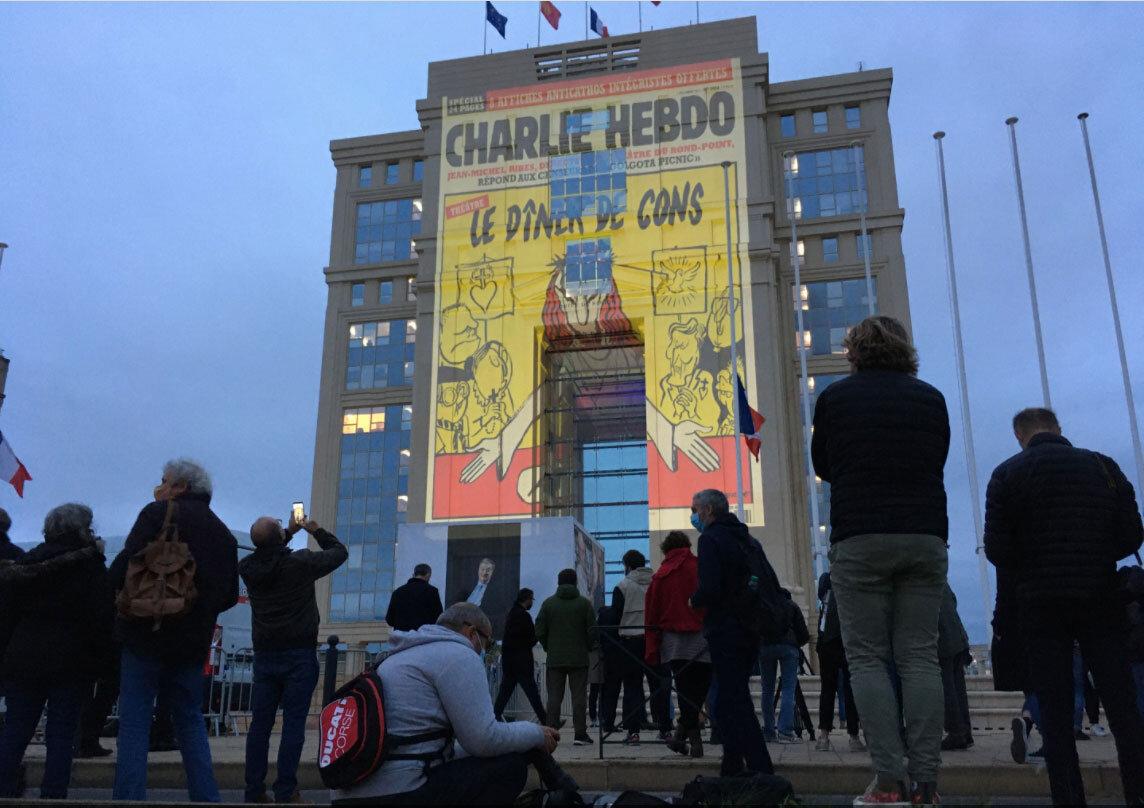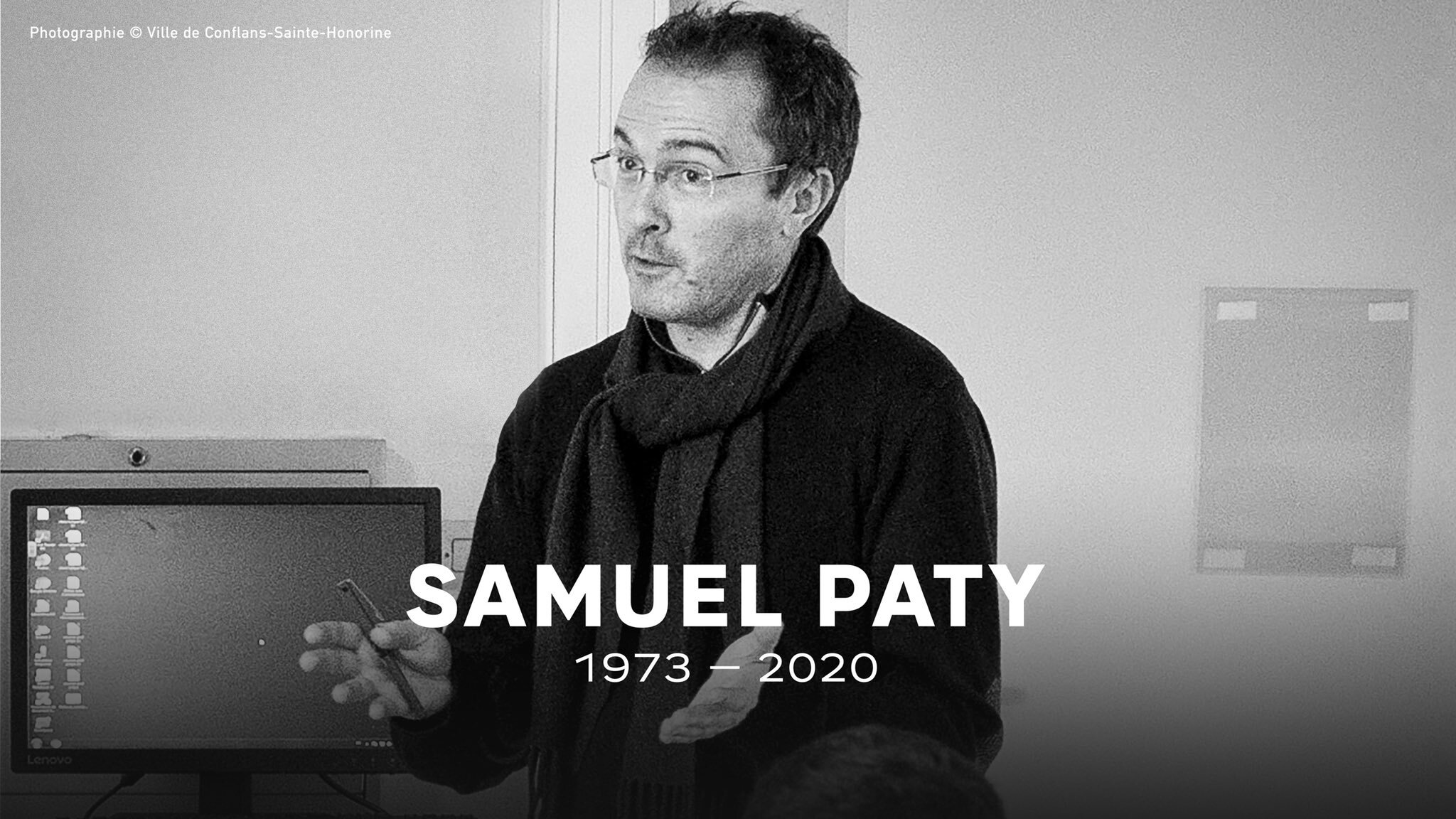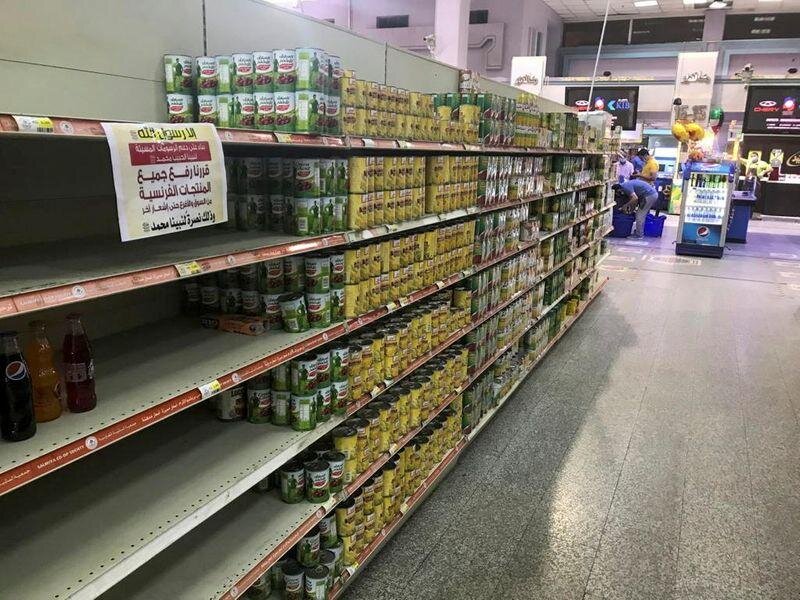
Jordan Elgrably
France and its Muslims are at loggerheads over the horrific beheading of schoolteacher Samuel Paty and the national response, which has put Islam on alert.
On October 16, Paty was cornered outside his school in Conflans, a Paris suburb. He was beheaded by an 18-year-old Chechen Muslim who was heeding a fatwa that condemned Paty for displaying satirical cartoons of the Prophet in a class discussing freedom of expression.
A few days later, two women in hijab near the Eiffel Tower were reportedly stabbed by two French women shouting epithets, including “dirty Arabs.”
On Sunday, calls to burn down the Ar-Rahma mosque in Béziers were launched on Facebook and police set up security around the mosque.
As the Washington Post’s James McAuley noted today, “In the week since the attack in the Paris suburb of Conflans-Sainte-Honorine, Macron’s government has ordered a crackdown on Muslim organizations it accuses of fomenting terrorist violence, and defended the caricatures of Muhammad as emblematic of the French values of secularism and free expression, even if they are deeply offensive to many of France’s Muslim citizens, among its largest minority populations.”

France is home to the largest Muslim population in Europe, and maintains at times strained relationships with former colonies, Lebanon, Algeria, Tunisia and Morocco.
Samuel Paty was a 47-year-old middle school teacher who had sought out sensitivity training to learn more about Islam and his Muslim students. Along with a number of like-minded colleagues, he spent November 7, 2019 in a day-long seminar for teachers at the Institut du Monde Arabe (Arab World Institute) in Paris, where he made an impression on the Institute’s staff. On a memorial page for Paty on the institute’s website, they write, “The IMA team remembers a man who was passionate and full of questions about the Arab world. Following his visit [last year], in January 2020, he had requested a visit by one of our animators at his college to present his students with an educational concert mixing Arab-Andalusian music from the Maghreb and the music of 13th century troubadours in France.”
Why push the envelope?
We know how Islamic radicals reacted to French weekly Charlie Hebdo’s satirical cartoons when they shot up the magazine’s offices in January 2015, killing 12 and injuring 11. They continued their rampage in what would become France’s 9/11 when, a few months later, 130 were killed at the Bataclan Theatre and other Paris locations.
The question is, why do people working in the French media continue to behave with such insensitivity — why continue obdurate satirical attacks on Islam by choosing to portray the Prophet negatively, or portray him at all? One wonders how American Evangelicals would react to pornographic depictions of Jesus? Would Jews simply take it in stride if cartoons of Abraham or Moses depicted naked fanatics?
More to the point — what is the sense in satirizing sacred religious figures, if what you want to do is open a critical dialogue on a particular religion?
There is an argument to be made that freedom of expression includes the right to criticize religious dogma and skewer sacred cows, but it seems provocative to continue satirical salvos on the Prophet Muhammed when they have engendered fatwas and terrorist attacks that have killed hundreds of people across Europe.
To throw further oil on the fire, in connection with ceremonies mourning the death of Paty, the mayors of Toulouse and Montpellier, in collaboration with the government in Paris, went ahead and projected a portrait of Samuel Paty along with caricatures of the Prophet on their city halls. Among them were cartoons Paty had shown his students, published on the cover or inside Charlie Hebdo, including the image of the Prophet with a rabbi and the caption, “faut pas se moquer” or “do not make fun of.”
We will not give in, ever.
We respect all differences in a spirit of peace. We do not accept hate speech and defend reasonable debate. We will always be on the side of human dignity and universal values.— Emmanuel Macron (@EmmanuelMacron) October 25, 2020
Right now a great deal of pressure is coming down on French Muslims, who again are taking the heat for the radical extremism of one outraged Muslim, but ask yourselves, do whites in the U.S. feel they have to apologize each time a white supremacist shoots up a synagogue or a Black church? Why should the many have to apologize for the crimes of the few; why should an entire religion or race be scapegoated? Humanity has been down this road too many times in the past not to have learned these harsh lessons.
There are some who say that Macron’s heated rhetoric against Islam in Europe is fanning the flames of intolerance, but over the weekend the French president dug in his heels. “We will not give in, ever,” Macron tweeted. “We respect all differences in a spirit of peace. We do not accept hate speech and defend reasonable debate. We will always be on the side of human dignity and universal values.”
Europe’s hostility towards Muslims and efforts to ‘discipline’ them is inseparable from the increasingly widespread hostility towards Islam, Turkey and our president Recep Tayyip Erdoğan.
— Fahrettin Altun (@fahrettinaltun) October 25, 2020
But tensions between the French government and the Muslim community continue to escalate. After interior minister Gérald Darmanin not only called for shutting down a number of Islamic charities and anti-Islamophobia associations, but suggested that he would like to remove the Arabic ethnic food sections from French supermarkets, boycotts of French products have been declared in Kuwait, Jordan and Saudi Arabia. Where will all this end?
To make things worse, over the weekend Turkish president Recep Tayyip Erdoğan said that Macron needed to see a shrink over his misguided remarks about Islam after Paty’s beheading. (Last year Erdoğan called Macron “brain-dead” in response to the latter’s remarks about NATO.) Writing in Le Point, French pundit Luc de Barochez notes that “the burning Franco-Turkish antagonism proves that the struggle against radical Islam in France cannot be detached from its international context.” Meanwhile, Turkey’s communications director, Fahrettin Altun, tweets: “Europe is an increasingly dangerous place for Muslims. The dog whistle politics of offensive caricatures, accusations of separatism against Muslims, and mosque raids isn’t about freedom of expression.” He adds, “Europe’s hostility towards Muslims and efforts to ‘discipline’ them is inseparable from the increasingly widespread hostility towards Islam, Turkey and our president Recep Tayyip Erdoğan.”
To return to the beheading of Samuel Paty for a moment, his attacker, Abdoullakh Anzorov, was brought to France from Chechnia by his father when he was six. That means almost the entirety of his education was in the French public school system, which emphasizes secularism, or laïcité. How did he get so radicalized, wonders Anass Kassem, an agnostic Syrian Muslim who has made his home in Montpellier since 2005. “Anzorov’s father is allegedly a Russian refugee supposedly persecuted for being a Muslim by the Russians. So France gives them shelter and protection, a free secular education for his son and yet he cuts off the head of the poor professor — whose fault is this? Is it the Russians’? the French system’s? the Americans’ who helped and supported the Chechen rebels in order to stymie the Russians? Or is it just Islam’s fault?”
Regardless, on Friday, Kuwait announced its boycott against French products as a social media campaign against France went viral in the Arab world. Two days later, according to Reuters, in “Saudi Arabia, the Arab world’s largest economy, a hashtag calling for the boycott of French supermarket retailer Carrefour was the second most trending on Sunday.” French products are coming off the shelves in Jordan and Qatar as well.

The French-Moroccan firebrand Zineb El Rhazoui — a former journalist at Charlie Hebdo who covered Islam and who describes herself as an atheist — continues to receive death threats for being a constant critic of Islam. She leaves her Paris home under armed guard. After Interior Minister Gérald Darminin said he planned to shutter the Collective Against Islamophobia (CCIF) for giving succor to French Muslim extremists, El Rhazoui spoke out on French television’s TF1, saying she reserves the right to criticize Islam or Islamic radicals without being called a “racist,” which she argues is how the CCIF frames its opposition to everyone who levels criticism against Islam.
She says that the CCIF, “the flagship of the Islamist arsenal in France, has been militating for years against a ‘crime’ that is not a ‘crime’ in French law; I am referring to this semantic imposture called ‘Islamophobia’. The CCIF’s tactic is to place itself under the banner of the fight against racism, the definition of which is framed by law, in order to benefit from the same legal protections. Anyone who criticizes Islam is automatically treated as a racist, a legal blackmail that it is high time to make ineffective.”
Thanks to shameless Islamist propaganda relayed criminally at face value by Anglo-Saxon mainstream media such as the @washingtonpost and the the @nytimes, fatwas against freedom of speech in France are mushrooming in certain parts of the Muslim world#TerrorAccomplicies https://t.co/qbARnfRIyn
— Zineb El Rhazoui (@ZinebElRhazoui) October 25, 2020
In El Rhazoui’s view, calling critics of Islam “racist” is akin to calling proponents of the Boycott Divestment Sanctions movement against Israel’s apartheid system for Palestinians “anti-Semitic.” Not one to pull her punches, on Sunday El Rhazoui criticized the American media. She tweeted “Thanks to shameless Islamist propaganda relayed criminally at face value by Anglo-Saxon mainstream media such as the @washingtonpost and the @nytimes, fatwas against freedom of speech in France are mushrooming in parts of the Muslim world.”
Others in France who are working to mend fences or build bridges between Muslims and the general population find themselves under heightened scrutiny, and some have received death threats — from both French rightwingers and Islamic extremists. Anthropologist Dounia Bouzar, author of The Temptations of Extremism, argues that she’s dedicated her life to strengthening relationships between Muslims and non-Muslims, yet has been called an “Islamo-collaborator” on one hand and on the other, a traitor to Islam, her Algerian father’s religion.
Certainly as the temperature rises among the French and French Muslims, (not to mention among Muslims worldwide), arts organizations that are devoted to promoting cross-cultural entente, such as the Institut du Monde Arabe in Paris and the Festival Arabesques in Montpellier, will truly have their work cut out for themselves.


